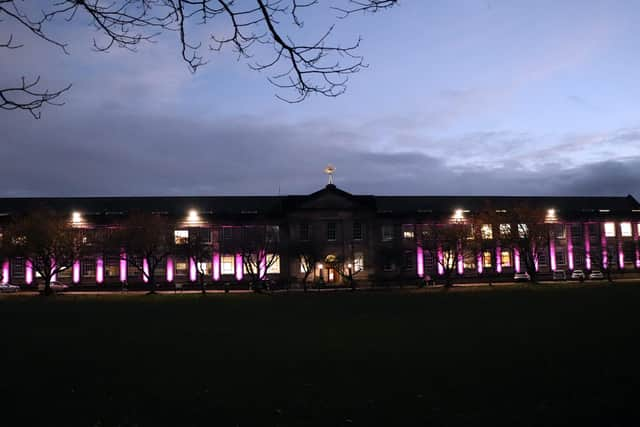Daughter speaks out about losing father to ‘cruel cancer’ as Edinburgh turns purple for World Pancreatic Cancer Day
and live on Freeview channel 276
Let us know what you think and join the conversation at the bottom of this article.
James Meikle was a fit and healthy 79-year-old when he was diagnosed with pancreatic cancer in May 2018.
Nausea, weight loss and pain in his abdomen were the only signs something was wrong and Mr Meikle continued running the family farm in Perthshire and living a normal life up until his diagnosis.


Advertisement
Hide AdAdvertisement
Hide AdBut only 12 weeks after he was diagnosed, the ‘healthy’ and ‘active’ grandfather died in August 2018 after a short but aggressive battle with the illness.
Mr Meikle’s daughter, Nicola Aitkenhead, from South Edinburgh, has spoken out about the pain of losing her father to mark World Pancreatic Cancer Day.
The 55-year-old mother hopes to spread awareness of the illness and encourage others to check in on their own health more regularly.
Mrs Aitkenhead said the ‘cruelest’ part of pancreatic cancer is the symptoms are very subtle and hard to spot until it’s too late, leaving little time to say goodbye.
Advertisement
Hide AdAdvertisement
Hide Ad“It all happened so quickly,” she said. “I think it’s the worst part about this cruel cancer, that it takes life away overnight.
“My dad might have been 79 but he was not an eldery man. He was a very fit and active man who went from being very healthy to then passing away 12 weeks later. It was heartbreaking to watch.”
80 per cent of patients are diagnosed too late for treatment
According to Pancreatic Cancer UK around 80 per cent of patients are diagnosed when it is too late for lifesaving treatment.
This is because symptoms are vague and hard to spot which leads to three out of five people being diagnosed at a late (stage 4) where potentially curative surgery is not possible.
Advertisement
Hide AdAdvertisement
Hide AdLife expectancy for stage 4 is very low, estimated to be about three to five months and less than seven per cent of people with pancreatic cancer will survive beyond 5 years in the UK.
Mrs Aitkenhead, who used to work as a nurse said “nothing can prepare you for the loss” and is determined to help protect others from suffering as her family did by raising awareness of the disease and helping ensure early diagnosis.
City turns purple in solidarity
To mark World Pancreatic Awareness Day, Mrs Aitkenhead and her family will light their house up with purple lights in memory of her father on Thursday, November 18.
Many of the Capital’s historic buildings will also light up the city’s skyline purple including George Watson's College, where Mr Meikle’s grandson is a fifth year student.
Advertisement
Hide AdAdvertisement
Hide Ad“The day he passed was my son's first day at senior school at George Watson's College,” said Mrs Aitkenhead. “I think he is very proud that his school is taking part.”
Education heads at the school have said their community have felt the impact of pancreatic cancer and are keen to light up the school in support.
Head of senior school at George Watson’s College, Gordon Boyd said: “We are very keen to support this day because of the unfamiliar nature of the disease and because of the need for early detection.
“As in every community, members of our Watson's community have been directly affected by the impact of pancreatic cancer.”
Advertisement
Hide AdAdvertisement
Hide AdYesterday, SNP MSP Clare Adamson led a debate in The Scottish Parliament to mark the poignant occasion and to highlight initiatives across Scotland which are creating innovations within precision medicine and trailblazing new treatments for people with the disease.
She said: “There remain grave and important challenges that we must meet but there is now cause for cautious optimism as we begin to emerge from the pandemic and tackle the injustice of this cancer.“Huge strides have been made in Scotland; our country is leading the way in innovation in pancreatic cancer treatment and I am hopeful that we will start to see positive change."
A message from the Editor:
Thank you for reading this article. We're more reliant on your support than ever as the shift in consumer habits brought about by Coronavirus impacts our advertisers.
If you haven't already, please consider supporting our trusted, fact-checked journalism by taking out a digital subscription.
Comment Guidelines
National World encourages reader discussion on our stories. User feedback, insights and back-and-forth exchanges add a rich layer of context to reporting. Please review our Community Guidelines before commenting.